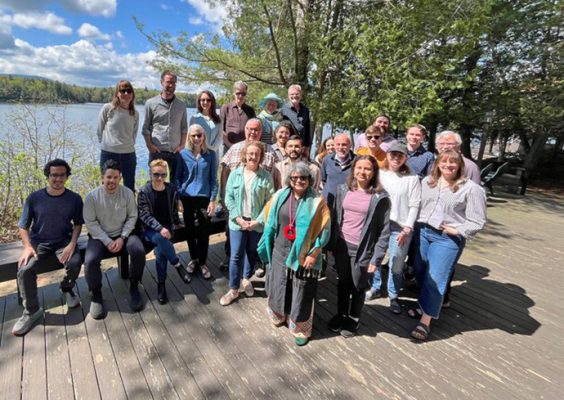The Green Teaching Summit held at the Minnowbrook Conference Center in the Adirondacks brought together attendees from various disciplines to explore how the humanities can contribute to addressing climate change, environmental issues, and ecology. Mike Goode, professor of English and outgoing William P. Tolley Distinguished Teaching Professor in the Humanities at Syracuse University, spearheaded this initiative to showcase the importance of humanities subjects in understanding and responding to today’s complex ecological challenges.
One key aspect highlighted during the summit was the role of humanists in translating and communicating the insights derived from maps, which depict data about power, representation, and climate urgency. These insights are crucial for leaders making decisions about resource allocation and policy implementation. Additionally, humanists study language endangerment caused by climate change, examining the causes, processes, and consequences of languages becoming extinct and working on ways to preserve them.
Religion scholars also play a vital role in exploring the environmental consequences of religious festivals and pilgrimages, as well as how sacred texts shape environmental consciousness in different faith traditions. This research sheds light on political issues and raises doctrinal concerns. Furthermore, discussions about human-animal entanglements, such as those found in bestiaries depicting mythical animals, can spark valuable conversations about the relationships between humans and animals in various contexts.
Goode’s professorship aimed to facilitate collaborations among faculty and staff across campus to help students understand and respond to the implications of the climate crisis. Inspired by a successful collaboration with the Syracuse University Art Museum, where objects and artworks were used to teach about ecology and climate, Goode organized the Green Teaching Summit to encourage partnerships and elevate research and teaching around ecology. The summit provided a platform for scholars to discover shared interests and forge collaborations in an ecologically vulnerable setting.
In an interview, Goode emphasized the critical role of humanists in focusing on ecology and climate, highlighting the need for humanities courses to engage with these topics in the near future. The summit aimed to empower humanities scholars with the perspectives necessary to raise awareness, inspire action, and shape socially just and culturally sensitive policies. By connecting faculty from various environmental disciplines and showcasing campus resources, the summit sought to foster collaborations and initiatives that would benefit both current and future generations of scholars.
The setting of the Adirondacks added a sense of urgency to the discussions, as talks touched on the region’s ecological vulnerability and its connection to histories of environmental injustice. Attendees expressed surprise at the number of faculty teaching in these areas and were excited to meet colleagues with shared interests. As Goode concludes his Tolley professorship, he hopes that the legacy of the Green Teaching Summit will inspire continued collaboration and engagement with environmental issues across campus.
Overall, the Green Teaching Summit exemplifies the importance of interdisciplinary collaboration and the role of the humanities in addressing climate change and environmental challenges. By bringing together scholars from various disciplines, the summit provided a platform for sharing knowledge, fostering partnerships, and inspiring action towards a more sustainable future.


